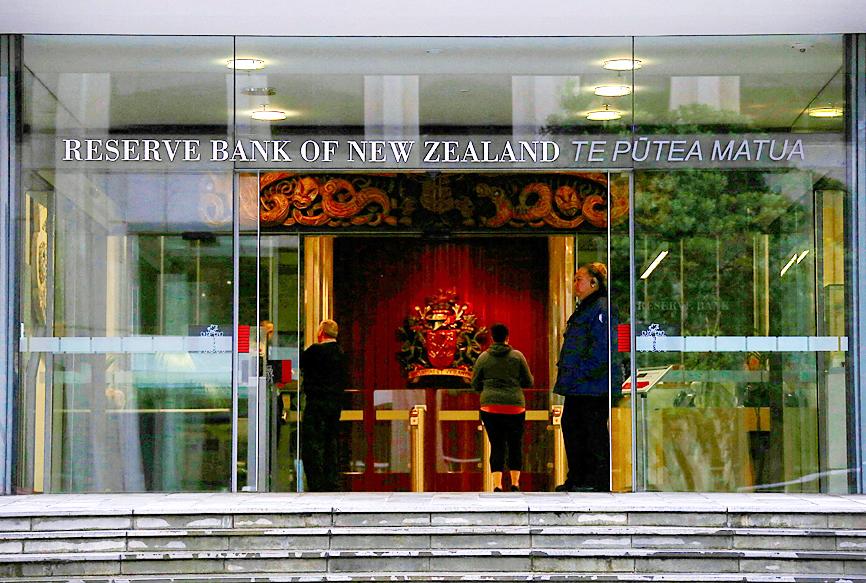New Zealand’s central bank yesterday raised interest rates by half a percentage point, its biggest hike in 22 years, indicating it is worried that inflation is getting out of control.
The Reserve Bank of New Zealand’s (RBNZ) Monetary Policy Committee lifted the official cash rate (OCR) to 1.5 percent from 1 percent, the first time it has delivered an increase of that magnitude since 2000.
“The committee agreed that their policy ‘path of least regret’ is to increase the OCR by more now, rather than later, to head off rising inflation expectations,” the RBNZ said. “It is appropriate to continue to tighten monetary conditions at pace.”

Photo: Reuters
The central bank has raised the cash rate for four straight policy meetings, lifting it by 125 basis points since October last year, as inflation surged to a 32-year high. The risk is that the rapid rise in borrowing costs could stall the economy. House prices are already falling, and business and consumer confidence have slumped amid New Zealand’s worst COVID-19 outbreak.
“The RBNZ’s decision to accelerate its hiking cycle shows it is willing to move decisively to get a hand on surging inflation,” said Ben Udy, an economist at Capital Economics in Singapore. “We expect it to hike the OCR to 3 percent by the end of this year.”
In its statement, the RBNZ said it remains comfortable with the forward track for the cash rate it published in February, indicating it sees no need to take rates higher than the 3.25 percent peak it forecast for the end of next year.
However, it said it wants to get the OCR “to a more neutral stance sooner.”
It estimates a neutral level for the cash rate is about 2 percent.
“The committee noted that the OCR is stimulatory at its current level,” it said. “Members noted that annual consumer price inflation is expected to peak around 7 percent in the first half of 2022. The risk of more persistent high inflation expectations has increased.”
The RBNZ aims to keep inflation around the middle of a 1 to 3 percent target range.
New Zealand is at the forefront of global policy tightening as central banks around the world respond to an inflation surge that is threatening to become entrenched. The Bank of Canada was expected to raise its key rate by half a point to 1 percent later yesterday, while the Bank of Korea might add to its three rate hikes today.
The US Federal Reserve began its tightening cycle last month and its policymakers have signaled they could move in half-point steps if needed. The Reserve Bank of Australia this month opened the door to rate increases, with economists tipping its first hike would come in early June.
“Heightened global economic uncertainty and inflation are dampening consumer confidence,” the RBNZ said. “The rise in mortgage interest rates — amongst other factors — have acted to reduce mortgage demand and house prices.”
Russia’s invasion of Ukraine is worsening inflation by driving up commodity prices, while also hurting confidence and dampening the economic outlook.
“A larger move now also provides more policy flexibility ahead in light of the highly uncertain global economic environment,” the RBNZ said.

KEEPING UP: The acquisition of a cleanroom in Taiwan would enable Micron to increase production in a market where demand continues to outpace supply, a Micron official said Micron Technology Inc has signed a letter of intent to buy a fabrication site in Taiwan from Powerchip Semiconductor Manufacturing Corp (力積電) for US$1.8 billion to expand its production of memory chips. Micron would take control of the P5 site in Miaoli County’s Tongluo Township (銅鑼) and plans to ramp up DRAM production in phases after the transaction closes in the second quarter, the company said in a statement on Saturday. The acquisition includes an existing 12 inch fab cleanroom of 27,871m2 and would further position Micron to address growing global demand for memory solutions, the company said. Micron expects the transaction to

Vincent Wei led fellow Singaporean farmers around an empty Malaysian plot, laying out plans for a greenhouse and rows of leafy vegetables. What he pitched was not just space for crops, but a lifeline for growers struggling to make ends meet in a city-state with high prices and little vacant land. The future agriculture hub is part of a joint special economic zone launched last year by the two neighbors, expected to cost US$123 million and produce 10,000 tonnes of fresh produce annually. It is attracting Singaporean farmers with promises of cheaper land, labor and energy just over the border.

US actor Matthew McConaughey has filed recordings of his image and voice with US patent authorities to protect them from unauthorized usage by artificial intelligence (AI) platforms, a representative said earlier this week. Several video clips and audio recordings were registered by the commercial arm of the Just Keep Livin’ Foundation, a non-profit created by the Oscar-winning actor and his wife, Camila, according to the US Patent and Trademark Office database. Many artists are increasingly concerned about the uncontrolled use of their image via generative AI since the rollout of ChatGPT and other AI-powered tools. Several US states have adopted

A proposed billionaires’ tax in California has ignited a political uproar in Silicon Valley, with tech titans threatening to leave the state while California Governor Gavin Newsom of the Democratic Party maneuvers to defeat a levy that he fears would lead to an exodus of wealth. A technology mecca, California has more billionaires than any other US state — a few hundred, by some estimates. About half its personal income tax revenue, a financial backbone in the nearly US$350 billion budget, comes from the top 1 percent of earners. A large healthcare union is attempting to place a proposal before